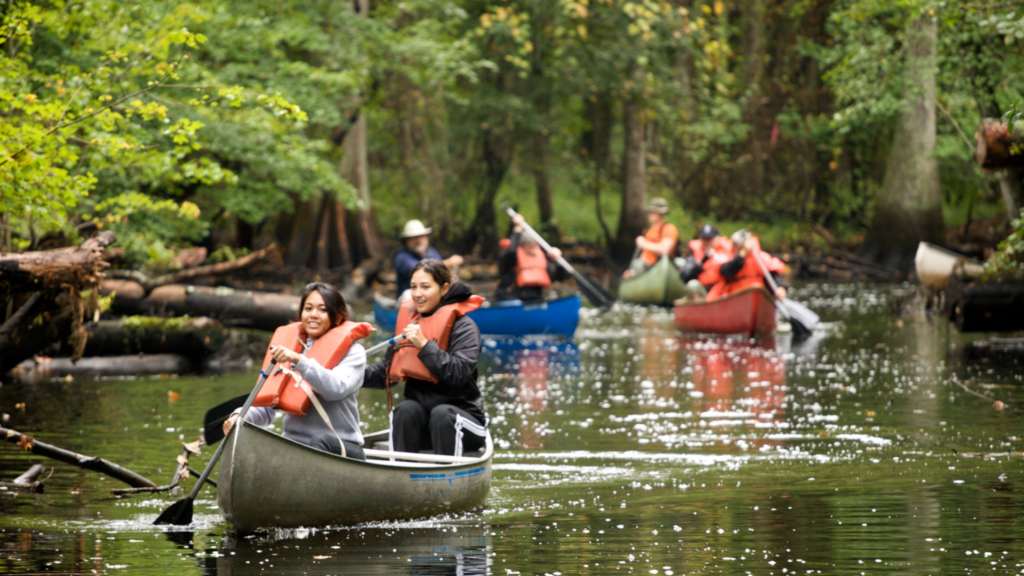We recently received an email from someone who is working in a rural mission area. Much of her work is focused on sacramental preparation, including the preparation of inquirers and catechumens. When she arrived, she found copies of a text that is often used in the United States for “RCIA classes.” She wrote, “There is no content in this book. There is nothing about what it means to be Catholic, and it is also not kerygmatic (based on an experience with Jesus). So we need some new material that we can than translate into the local language.”
I know the book the missionary is talking about, and I’m sure you do too. There are many such textbooks available, and it really doesn’t matter which one she’s referring to. Because the experience of Jesus cannot be captured in any textbook. We encounter Jesus in real life — in our families, among our friends, at school and work. We encounter Jesus in the beauty of creation. We encounter Jesus especially in the poor.
The goal of catechesis
When we are asked to teach the catechumens about Catholicism, it is tempting to think of the content of our teaching as the 24 topics in the textbook or the video series. But that is not the content of our faith. The content of our faith is our personal encounter with Jesus. The job of the catechist is not so much to deliver content as it is to discover what the Holy Spirit has been revealing to the seeker. Pope John Paul II said:
The definitive aim of catechesis is to put people not only in touch, but also in communion and intimacy, with Jesus Christ. (On Catechesis in Our Time, 5)
Of all the ways we can encounter Jesus, the premier way is in the Sunday liturgy. Future Cardinal Arthur Roche, Prefect of the Vatican’s Dicastery for Divine Worship and the Discipline of the Sacraments, said:
All the prayers that constitute the celebration of the liturgy on Sunday are mainly from the Sacred Scripture. Nearly always, nearly every word, nearly every nuance, is coming from Scripture or from the Teaching of the Fathers of the Church. So that itself, when you go to Mass, you’re receiving the doctrine of the Church. (A conversation with future Cardinal Roche, Prefect of Divine Liturgy, Sacraments)
As is the case in many mission areas, people are not always able to participate in the Eucharist every week. Nevertheless, they can read the Sunday readings in their homes. Or, if they cannot read, they can gather to hear a catechist or community leader read them.
Focus on encounters with Jesus
Another common issue in some rural and mission areas is the lack of trained catechists. Sometimes it helps to remember that none of the first disciples had theology degrees. They catechized by talking about their own encounters with Jesus. Any Christian, no matter how “untrained,” can do the same.
If you are in a community that doesn’t have all the resources of some larger, better resourced parishes, here is a very simple method you can use to lead seekers into communion and intimacy with Jesus. You can easily train parents to do this with their children and volunteers from your community to do this with inquirers and catechumens.
The job of the catechist is not so much to deliver content as it is to discover what the Holy Spirit has been revealing to the seeker.
Mystagogical reflection
The leader gathers everyone. She asks them to gather in a spirit of prayer. There will be time for socializing later. A simple way to keep the prayerful sense of the liturgy is to recite the refrain of the responsorial psalm from the Sunday Mass and have the participants recite it back. If the leader or someone in the group is at all musical, by all means, sing the psalm refrain.
Next, have everyone sit in the circle. The leader proclaims the Sunday gospel (or, if there is time, she also proclaims one or both of the first two readings as well).
After the proclamation, all sit in sacred silence for one or two minutes. Then the leader asks everyone to tell one thing they remember from the reading.
The leader then leads everyone in deeper look at the reading. She focuses on three simple questions:
- What did you see?
- What did you hear?
- What does it mean?
What do you see?
After everyone has spoken, the leader asks them to go deeper into the reading. Have them open their Bibles to the passage they said they remembered. Ask them each to name something they see in the reading. (If they don’t have Bibles, the leader can read the passage again for them.) Keep going deeper, and keep focused on what they see. Characters, scenery, actions, crowds. Ask them to describe in as much detail as they can.
What do you hear?
Now go around again, asking everyone what they hear in the reading. Background sounds, quietness, wind, people talking. Pay particular attention to questions they hear spoken. Ask them if they heard anything new or surprising.
What does it mean?
Ask everyone to reflect in silence for a minute on why they think these readings matter. After some silence, ask the group questions about what the readings mean. Ask how, having seen and heard what they have, their lives might be different in the coming week. Ask if they have discovered anything new about themselves, about God, or about the church. Ask what questions they are struggling with.
The leader then summarizes what she heard from the group and closes with a prayer.
You can adapt this process to reflect on the life of the community or the family. For example, one time the bishop came to visit our parish, and we had a big party. I took the catechumens to the party and introduced them to the bishop. Then, at a later time, I reflected with them on the event using the three questions.
If you would like to go deeper with some other reflection questions that flow from the Sunday readings here are two free resources you can use:
If your seekers do this every week for at least one full liturgical year, they will be deeply immersed in God’s word and in the teaching of the church, which is all based on God’s word.
Your turn
What does an experience with Christ look like in your community? What new ways could you incorporate with your seekers in the coming months? Share your thoughts in the comments below.


















